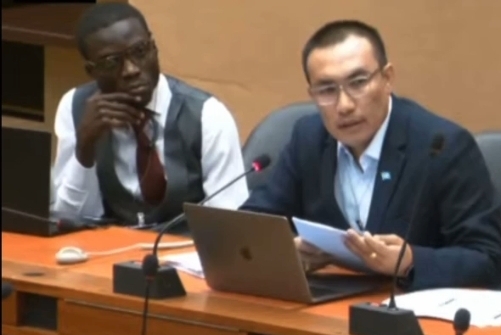Various Narco-terrorist groups have resorted to recruiting mercenaries to advance their objectives
 KRC TIMES Manipur Bureau
KRC TIMES Manipur Bureau

Imphal: The Vice President of the International Peace and Social Advancement (IPSA), a powerful outfit in Manipur has drawn the attention of the United Nations to the engagement of mercenaries in the ongoing communal clashes between the Meiteis and Kukis that cost over 175 lives of which 96 are still unclaimed.
Khuraijam Athouba, VP of IPSA was speaking in the 54th Session of the United Nations Human Rights Council (UNHRC) in Geneva, Switzerland on Tuesday. He said, “Of the 175 people killed in the ongoing ethnic violence, 96 bodies are still unclaimed and are lying at different hospitals highlighting the involvement of mercenaries employed by narco-terrorist groups during the ongoing upheaval in the state.”
Bodies of 79 have been claimed by their relatives as of Wednesday. This was informed by the VP in a statement issued by (IPSA) here on Wednesday.
The use of mercenaries in Manipur is an acute concern that demands immediate and concerted attention. By unequivocally condemning and actively countering the involvement of mercenaries in this region, we can take substantial strides toward upholding the fundamental principles of human rights. In doing so, we can pave the way for peace, stability, and justice for all, Kh Athouba said.

5 Advantages of KRC 5E for Success MDP course, powered by KRC Foundation.
Employability training
Internship
Earn while you learn ( Work Experience Certificate, subject to selection and performance)
100% Cashback on Fees through Global Garner
KRC Membership & Placement assistance.
Send your resume to get a free profiling session and selection.
Email resume: 5eforsuccess@gmail.com
WP: 9531090090
The influence of mercenaries in the ongoing communal clash presents a grave concern that not only challenges the bedrock principles of human rights but also obstructs the inherent rights of people residing in the northeastern state of Manipur, Kh Athouba told the session.
Various Narco-terrorist groups have resorted to recruiting mercenaries to advance their objectives. The inclusion of mercenaries in these conflicts has further complicated an already intricate socio-political landscape, resulting in grave human rights violations and the disruption of peace processes in this sensitive border state.
These narcoterrorist groups, through their utilization of mercenaries, have escalated the conflict and exacerbated tensions, imposing a heavy toll on indigenous communities like the Meetei, Nagas, etc. who often find themselves on the frontlines.
The deployment of mercenaries in these regions is not only a violation of international law but also serves to intensify tensions, perpetuate human suffering, and protract conflicts that could otherwise be resolved through peaceful means.
It is imperative for the international community to forge close partnerships with the affected nations and communities. Such collaboration should encompass support for conflict resolution, peacebuilding initiatives, and the safeguarding of human rights, Kh Athouba added.


